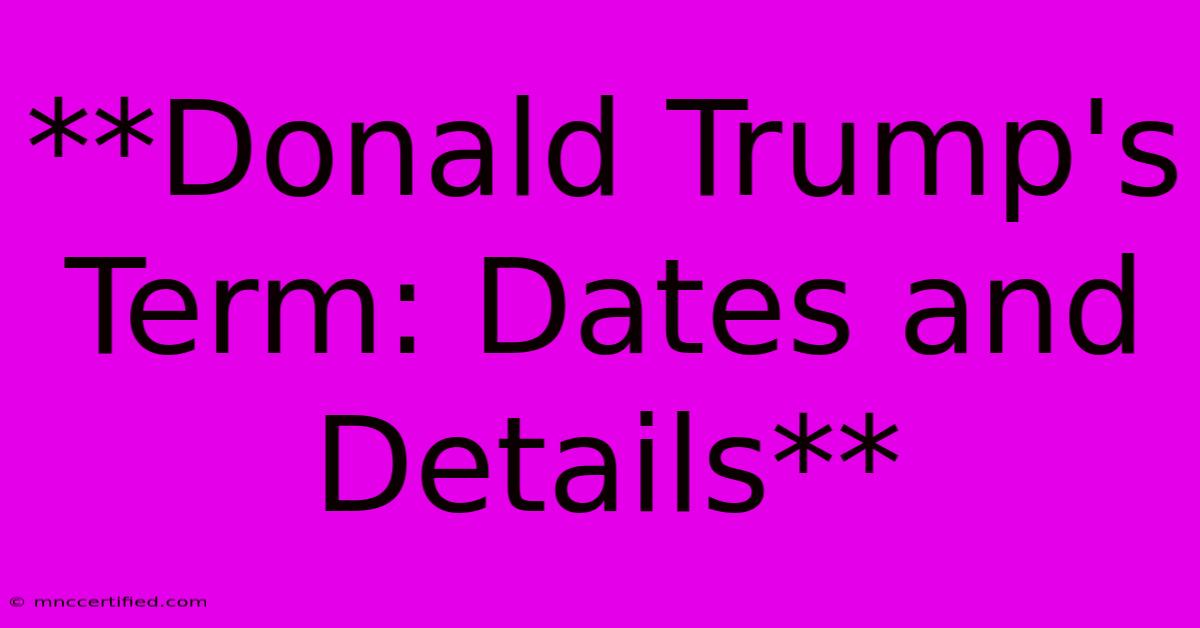**Donald Trump's Term: Dates And Details**

Table of Contents
Donald Trump's Presidency: Dates, Details, and Impact
Donald Trump, the 45th President of the United States, served one term in office from January 20, 2017, to January 20, 2021. His presidency was marked by significant political and social upheaval, both domestically and internationally.
Key Dates and Events
Inauguration: January 20, 2017
Notable Policy Changes:
- Tax Cuts and Jobs Act (2017): A major tax reform bill that reduced taxes for corporations and individuals.
- Withdrawal from the Trans-Pacific Partnership (2017): Trump withdrew the United States from the trade agreement, citing its negative impact on American jobs.
- Travel Ban on Citizens from Several Muslim-Majority Countries (2017): This controversial executive order aimed to restrict travel from certain countries, sparking legal challenges and protests.
- Appointment of Conservative Supreme Court Justices (2017-2020): Trump appointed Neil Gorsuch, Brett Kavanaugh, and Amy Coney Barrett to the Supreme Court, shifting the ideological balance of the court.
- Negotiation of New Trade Deals (2018-2020): Trump renegotiated trade agreements with Mexico, Canada, and China, focusing on reducing trade deficits and protecting American jobs.
- Withdrawal from the Paris Agreement on Climate Change (2017): Trump announced the United States' withdrawal from the international agreement aimed at combating climate change.
- Impeachment (2019): Trump was impeached by the House of Representatives for abuse of power and obstruction of Congress, but was acquitted by the Senate.
Major Domestic Issues:
- Immigration: Trump's presidency was marked by a strong focus on immigration policy, including building a wall on the US-Mexico border and enacting a zero-tolerance policy that separated families at the border.
- Healthcare: Trump and his administration made attempts to repeal and replace the Affordable Care Act (ACA), but were unsuccessful.
- Gun Control: Trump largely opposed stricter gun control measures, despite calls for action following mass shootings.
International Relations:
- North Korea: Trump engaged in unprecedented diplomatic efforts with North Korean leader Kim Jong-un, but negotiations for denuclearization ultimately failed.
- Russia: The Trump administration faced intense scrutiny over its relationship with Russia, including allegations of Russian interference in the 2016 election.
- China: Trump engaged in a trade war with China, imposing tariffs on Chinese goods.
- Middle East: Trump recognized Jerusalem as the capital of Israel and withdrew the United States from the Iran nuclear deal.
2020 Election:
- Re-election Campaign: Trump campaigned for re-election on a platform of economic growth, strong national security, and a focus on "America First" policies.
- Loss to Joe Biden: Despite winning several key states in 2016, Trump lost the 2020 election to Democratic nominee Joe Biden.
Legacy and Impact
Donald Trump's presidency was a highly divisive period in American history. He polarized the nation, fostering deep divisions along partisan lines.
His supporters praised his economic policies, his commitment to "America First" principles, and his bold approach to foreign policy. They saw him as a strong leader who stood up for American interests.
His critics condemned his rhetoric, his policies, and his attacks on democratic institutions. They argued that his presidency damaged American democracy and weakened its standing in the world.
Trump's legacy will continue to be debated for years to come. His impact on American politics, culture, and society is undeniable, and its effects will likely be felt for generations to come.
Further research and analysis are needed to fully understand the long-term consequences of Donald Trump's presidency.
This article provides a comprehensive overview of key dates, events, and policies of Donald Trump's presidency. It's important to note that this is a complex and nuanced topic, and this article is just a starting point for further investigation and understanding.

Thank you for visiting our website wich cover about **Donald Trump's Term: Dates And Details**. We hope the information provided has been useful to you. Feel free to contact us if you have any questions or need further assistance. See you next time and dont miss to bookmark.
Featured Posts
-
Sf Mayoral Race Lurie Edges Breed In Early Results
Nov 07, 2024
-
Watch Red Star Belgrade Vs Opponent Champions League Live
Nov 07, 2024
-
Independent Insurance Center Manchester Ct
Nov 07, 2024
-
Are Prenatal Massages Covered By Insurance
Nov 07, 2024
-
Honig Jack Smiths Potential Outcomes
Nov 07, 2024